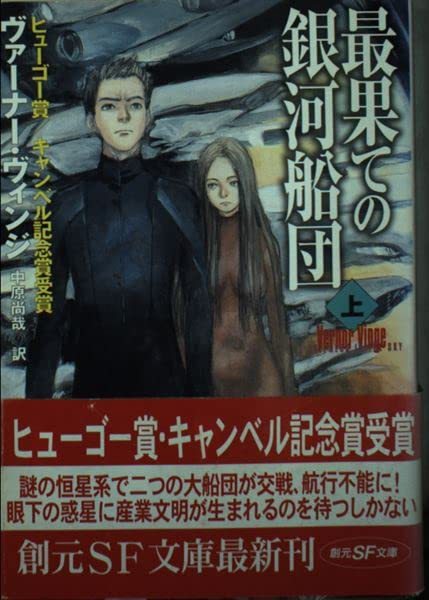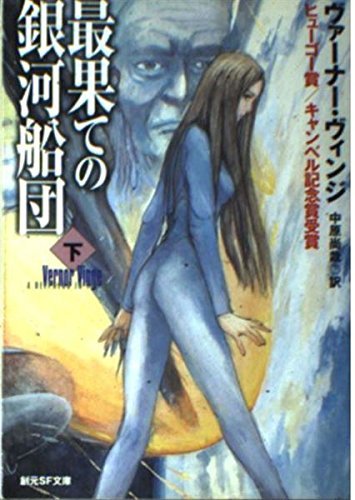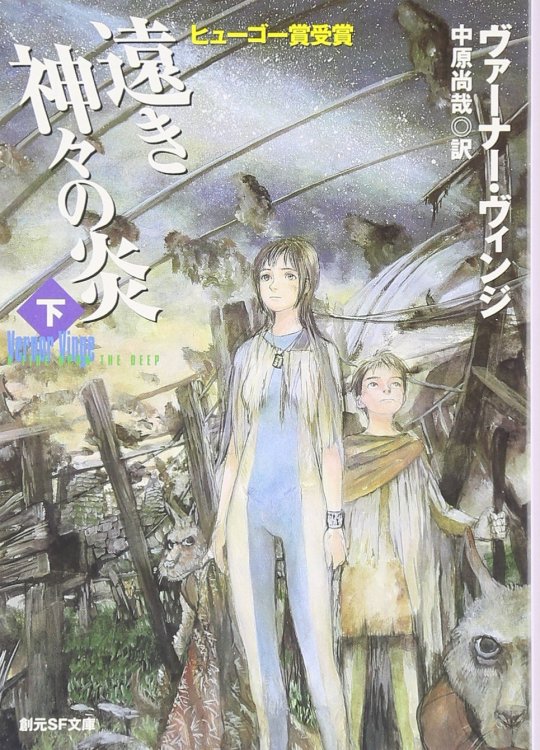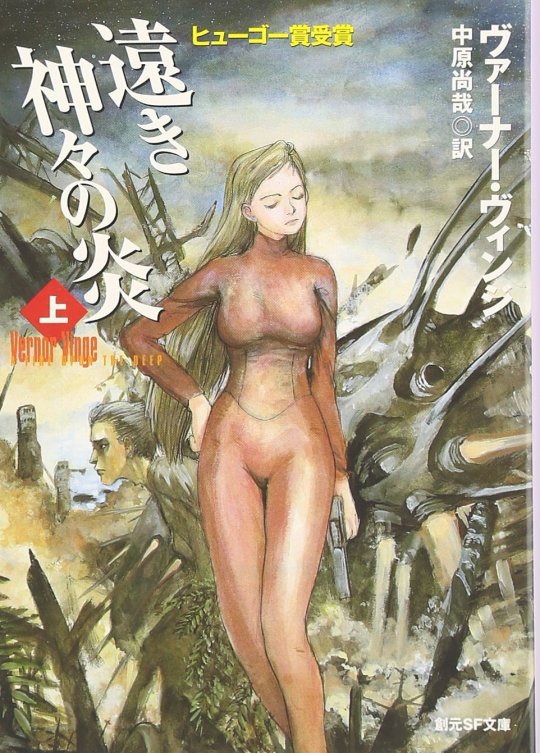#A Fire Upon The Deep is by Vernor Vinge
Explore tagged Tumblr posts
Note
I am very sorry. I just saw any leech stuff and freaked out because I just finished that book and O U G H
- 🐀
Don't ever be sorry for freaking out about a good book. If I were still a bookseller I'd be slapping people across the face with it.
I really love me a narrative shift like this book pulls. AND it's on top of multiple layers of unreliable narrator? Boss move.
I really like the hive mind concept in general, and loved the way it was handled in A Fire Upon The Deep, if you care for crazy scifi. It was also very interesting in Ancillary Justice, which also has unwilling hosts/a parasitic quality.
If you want a recommendation for a book that mind fucks you over time in that same way, I recommend you read Sheri S. Tepper's book Grass, and then the second one Raising the Stones.
I often describe her way of writing as making me feel like a snake, properly charmed. She pulls the wool over your eyes. I frequently thought about Tepper's work while reading Leech. Things not being as they seem, the slow buildup of evidence that flies under the radar, the pov shift that leaves you scrambling...
I was still super surprised by the bold choice of having this Franco-English pigdin language. It felt very tailor made for a bilingual reader like myself, but idk how hostile that must have felt to a monolingual reader. The whole world slowly revealing itself to be far future instead of fantasy gothic alone... Genuinely this book felt like a puzzle at times, with lots of missing pieces.
Very very fun! Glad you liked it.
#Also Tepper is a feminist#And has some strong anti Christian messages lol#She was a girl boss of the 60s/70s#She wrote Gate To Women's Country#Can't recommend her enough#A Fire Upon The Deep is by Vernor Vinge#His short story... Real names? I think?#Basically invented the Internet and concepts of secret/anon identities online#People would induce hallucinatory states to VR online lmao#It's very prescient#His Deep series is FUCKED THOUGH#In a good way
4 notes
·
View notes
Text

Made a Tine! Her name is "Seeker" or "Ramdimirukam" Carver and I have been obsessed over this book/species for a while now.
Tines are a pack species from "A Fire Upon the Deep" - What you see here is one character, spread between four fragments. They use those patches on their heads and hips to transmit thoughts through the air, and to receive thoughts of nearby members. I very highly recommend the book. It is so much better than I can do it justice
#a fire upon the deep#vernor vinge#science fiction#furryart#scifi#scifiart#books#Tines#aliens#alien species#zones of thought#ZoT
119 notes
·
View notes
Text



I bought more paperbacks.
(Also I got the Peter F. Hamilton books entirely based on enjoying Pandora's Star like twenty years ago and completely managed to not realize there's another book between The Dreaming Void and The Evolutionary Void.)
#the jupiter theft#the genesis quest#second genesis#cities in flight#ringworld#the faded sun trilogy#a fire upon the deep#lucifer's hammer#pandora's star#judas unchained#the dreaming void#the evolutionary void#hyperion#the fall of hyperion#endymion#the rise of endymion#the mote in god's eye#throne of the crescent moon#a talent for war#donald moffitt#james blish#larry niven#c. j. cherryh#vernor vinge#jerry pournelle#dan simmons#saladin ahmed#jack mcdevitt#books#science fiction
12 notes
·
View notes
Text

"Sometimes terror and pain are not the best levers; deception, when it works, is the most elegant and the least expensive manipulation of all."
2 notes
·
View notes
Text




The japanese covers for Vernor Vinge's "Zones of Thought" series are honestly a surprise. They have an emphasis on the human characters, which is not shown on the other covers. Most sci-fi book covers focus on the inhuman aspects, like ships, astral objects and alien species.
4 notes
·
View notes
Text
There was still a threat, but now he understood it better, and - as was true of all great threats - it held great promise.
Vernor Vinge, A Fire Upon the Deep
4 notes
·
View notes
Text
Review: A Fire Upon the Deep by Vernor Vinge
Series: Zones of Thought #1Author: Vernor VingePublisher: Tor Science FictionReleased: February 15, 1993 (Re-released March 20, 2007)Received: NetGalleyFind it on Goodreads | More Sci-Fi Summary: In a distant future, myriad races populate a cosmos where mental prowess aligns with spatial coordinates, spanning from the sublime intellects of the Transcend to the rudimentary faculties of the…
#A Fire Upon the Deep#A Fire Upon the Deep by Vernor Vinge#Book#Book Box#Book Review#Books#Fiction#Literary#Literature#Review#Science Fiction#Science Fiction Review#Tor#Tor Science Fiction#Vernor Vinge#Zones of Thought#Zones of Thought 1
0 notes
Text
Started reading a new book. A Fire Upon the Deep.
Trying to get any understanding of what I'm reading:
Prologue: It's from the pov of an emerging into consciousness as an AI, cool.
Chapter 1: No, changed perspective, it's about humans.
Chapter 2: ....guess we doing psychic alien dog polycules now
0 notes
Text
RIP mr Vinge.
Go read A Fire Upon the Deep
1 note
·
View note
Text
RIP, Vernor Vinge
Author and friend of Vernor David Brin made the announcement in a Facebook post, and I’ve seen it confirmed elsewhere as well that Vernor Vinge, who three times won the Hugo for best novel, has died. This is a tremendous loss to the world of science fiction, as Vernor’s best books, including A Fire Upon the Deep and A Deepness in the Sky (Hugo winners both) were the sort of mindblowing…

View On WordPress
88 notes
·
View notes
Text
i am a normal girl who had normal feelings reading the Blight speak through its human thrall of wonders and how any can be modified to receive Help as our human viewpoint character notes how most of the target audience, being nonhuman, would not recognize the cultural and biological context that shows a human that whatever humanity existed there is gone now. come closer
fundamental conflict of reading There Is No Antimemetics Division and arguably A Fire Upon The Deep is "this entity's way of pulling people and worlds into its ideatic space and consuming them is kind of fucking gender. and also this entity is a metaphor for fascism"
5 notes
·
View notes
Text
July Reading Recap
A Fire Upon the Deep by Vernor Vinge. I can see why people said this one had Adrian Tchaikovsky vibes because in terms of the worldbuilding and the alien species involved it absolutely did. I was not super enamored of the part of the plot that wasn't on the Tines' world (which was...an important part of the plot), but my investment in the politics of the Tines and the worldbuilding around them made up for it. I'm curious about the apparent sequel and whether it's worth reading - does anybody know?
Thousand Autumns: vol. 5 by Meng Xi Shi. I have finished Thousand Autumns and my verdict on it mostly hasn't changed from what it's been throughout: enjoyable but not really fully clicking for me. I liked it! But I didn't love it, and I don't know that it'll stick with me the way other books have, or compel me to do a reread.
A Fatal Thing Happened on the Way to the Forum: Murder in Ancient Rome by Emma Southon. Maybe I just don't have a sense of humor, but I felt like this book was trying too hard to be funny/clever and it landed wrong for me. It was interesting, certainly! And I learned some new things from it, and probably will go on to read the author's other book (about women in Ancient Rome), but this one tonally was not a winner, for me personally.
Ballad of Sword and Wine: vol. 1 by Tang Jiu Qing. Rereading this one (Qiang Jin Jiu, they're really going off in their own direction title translation-wise there) with the official published translation even though I am also binding it, because I can, I guess. And I still deeply appreciate how unhinged Shen Zechuan is, but in, like, mostly a way where it's not obvious to most people until they've known him for a little while. Also the sheer amount of politics, which I'm following better on this second readthrough. I think it'll be rewarding to reread.
The Pomegranate Gate by Ariel Kaplan. One of two Jewish fantasy books I read this month, just by chance (I wasn't intending on a theme, they'd both been on my to-read list for a while). I liked it a lot! I thought it was going to be a stand alone and feel a little funny about it being a series (I'm always looking for more stand alones), but I am also looking forward to more of it.
The Devil & Sherlock Holmes: Tales of Murder, Madness, and Obsession by David Grann. I've really enjoyed the other David Grann books I've read/listened to (The Lost City of Z, Killers of the Flower Moon) but found myself fairly underwhelmed by most of the essays here. It's not that they weren't good (they were) or interesting (most of them were), it just didn't feel like they were that good or that interesting. Maybe I just like his full-length books better.
Five Broken Blades by Mai Corland. It was fine? Not as good as I'd hoped. I called the twist which was satisfying for me personally. I don't know if I'm going to be reading the sequel. Most of the POV characters I liked fairly well, which is the main thing this book had going for it, but one of them bored me to tears and that inflected my enjoyment of the book as a whole.
The Vanished Birds by Simon Jimenez. This book earned its five stars by making me cry in the last 20%. Overall a beautiful book, though, relatively quiet; I wasn't sure about it early on but then it hit a turn that really got me. Makes me want to read his other book. The summary on the back really does not do the book justice but I don't actually know how I would explain it better, and I recognize that makes it a difficult recommendation.
When the Angels Left the Old Country by Sacha Lamb. This one was really good and a lot of fun. Very Jewish, too, which was enjoyable and not something I run into all that often in fantasy books. Just...very charming, entertaining, a joy to read.
I'm currently reading Godkiller by Hannah Kaner though I should be reading Edenville since I have it checked out from the library (I'll get to it!). I keep meaning to get back to reading more nonfiction (or realistic fiction) and then getting distracted. My plan for upcoming books, though, includes The Ratline, To Shape a Dragon's Breath, and (after years of having it sit on my shelf) Beauty Is a Wound. We'll see how on task I stay or if I end up wandering off to other stuff.
I'm currently looking for horror and mystery/thriller recommendations, though, so if anyone has any of those I will take them.
32 notes
·
View notes
Text
RIP, Vernor Vinge
Author and friend of Vernor David Brin made the announcement in a Facebook post, and I’ve seen it confirmed elsewhere as well that Vernor Vinge, who three times won the Hugo for best novel, has died. This is a tremendous loss to the world of science fiction, as Vernor’s best books, including A Fire Upon the Deep and A Deepness in the Sky (Hugo winners both) were the sort of mindblowing…

View On WordPress
23 notes
·
View notes
Text

One day in 1979, while logged in to San Diego State University’s principal computer from his home, Vernor Vinge found himself chatting to another user via the TALK program, both using implausible names and trying to figure out each other’s true name. “Afterwards, I realised that I had just lived a science-fiction story – at least by the standards of my childhood,” recalled Vinge, a mathematics and computer science teacher at the university, who has died from Parkinson’s disease aged 79.
The encounter was the starting point for his novella True Names (1981), one of the first sci-fi stories to predict an internet that is remarkably familiar to us 40 years later, with its fully immersive multiplayer role-playing games, dark web, hackers and trolls. Its descriptions of a virtual reality battle between Mr Slippery and the Mailman predated William Gibson’s Neuromancer by three years and, while it was Gibson who named “cyberspace”, Vinge was the godparent of its iconography.
At a meeting of the Association for the Advancement of Artificial Intelligence in 1982, Vinge coined the term “the Singularity” to describe the increasingly rapid acceleration of AI; he expanded on the concept in an editorial in the science and sci-fi magazine Omni, in which he said: “We will soon create intelligences greater than our own. When this happens … the world will pass beyond our understanding.”
A decade later, in The Coming Technological Singularity (1993), Vinge predicted that within 30 years “we will have the technological means to create superhuman intelligence. Shortly after, the human era will be ended.”
In his novel Marooned in Realtime (1986), a singularity event in the 23rd century known as “the Extinction” has repercussions 50 million years in the future, when only a handful of humans have been able to survive in “bobbles”, impenetrable force fields in which time slows to zero. One of the scientists trying to reconnect humanity is murdered – perhaps uniquely for a locked-room murder mystery, she is locked outside. This was a sequel to The Peace War (1984), in which the new stasis technology is shown to be misused by the ruling Peace Authority.
Vinge’s A Fire Upon the Deep (1992) and its prequel A Deepness in the Sky (1999) both won Hugo awards. A fine example of how Vinge could be rigorously true to his scientific beliefs without it limiting his ability to write galaxy-spanning space opera, A Fire Upon the Deep sidestepped the inevitability of all civilisations destroying themselves by dividing the Milky Way into “zones of thought”: the galaxy centre being the Unthinking Depths, surrounded by the Slow Zone and, a little further out, the Beyond, leading into Transcend. In this way he could write a far future-set adventure, where discoveries among the relics of a long-dead civilisation lead to the emergence of a malevolent AI called the Blight.
A Deepness in the Sky is set 30,000 years earlier, the characters unaware of the zones of thought, which makes it almost a standalone epic about an emerging spider civilisation unaware that it is being battled over by space-faring races.
Vinge won more Hugos, for the novellas Fast Times at Fairmont High (2001) and The Cookie Monster (2003) and the novel Rainbow’s End (2006), set in a near future dominated by augmented reality.
Born in Waukesha, Wisconsin, the son of Clarence Vinge, a teacher at the state college, and his wife, Ada (nee Rolands), Vernor earned a mathematics degree from Michigan State University in 1966, and a master’s (1968) and PhD (1971) from the University of California, San Diego. He began working as an assistant professor at San Diego State University in 1972, rising to associate professor of mathematics in 1978, and retiring in 2000.
Vinge described his youthful self as an imaginative child who “wanted interstellar empires (interplanetary ones at the least). I wanted supercomputers and artificial intelligence and effective immortality. All seemed possible.” Science fiction was his window into this world. He began writing as a teenager, selling one story, Apartness, to Michael Moorcock’s New Worlds magazine in 1965 and Bookworm, Run, a story involving an escaped chimp with enhanced intelligence, to John W Campbell’s Analog in 1966.
Damon Knight published Grimm’s Story in his 1968 anthology Orbit, and asked if Vinge could expand it into a novel. He could, as Grimm’s World (1969, later revised and expanded as Tatja Grimm’s World, 1987), with Tatja Grimm the ruler of a primitive planet who reaches out to greater civilisations, only to be beset by slavers. The Witling (1976) featured a world in which everyone has the power to teleport, and a shipwrecked anthropological team from Earth who are considered low-status “witlings” (half-wits), fit only for slavery.
Vinge’s last published novel, The Children of the Sky (2011) was a sequel to A Fire Upon the Deep. While he then retired from writing (only two vignettes were published later), his body of work continued to be recognised with various honours, including the Robert A Heinlein award in 2020, rewarding “an author whose body of work inspires the human exploration of space”.
Vinge married Joan Dennison in 1972; she wrote under the name of Joan D Vinge, and they divorced in 1979. He is survived by his sister, Patricia.
🔔 Vernor Steffen Vinge, mathematician, computer scientist and writer, born 2 October 1944; died 20 March 2024
Daily inspiration. Discover more photos at Just for Books…?
12 notes
·
View notes
Note
Children of Time by Adrian Tchaikovsky
For the Modern/Classic Sci Fi Ask Game
ngl I keep constantly forgetting this isn't an 80s-90s sweeping space epic. What do you mean this was published in 2015. Sounds Fake.
I think this is because I keep mentally classing it with Vernor Vinge's A Fire Upon the Deep/A Deepness in the Sky and Iain Banks's Culture series. I don't actually know enough about the Culture series to recommend it one way or another tbh, but I bet you would enjoy A Fire Upon the Deep by Vernor Vinge (1992). It has that grand sweeping galactic setting, alien intelligences, time weirdness because of vast space distances travelled, huge scope, and high stakes.
#can I call it underappreciated. It co-won a Hugo. I don't ever see anyone talking about it tho. Maybe I'm just looking in the wrong places#sorry if you're like 'of COURSE I've read A Fire Upon the Deep'#Alastair Reynolds's 'Revelation Space' would likely also be up your alley. However that was 2000 and outside this game's purview#asks#ask game#anonymous#science fiction#Children of Time#books#book recs
20 notes
·
View notes
